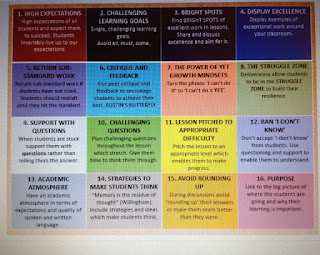Everyday challenge
A great blog peace from Class Teaching on every day challenge. Do read the full piece if you can on the link above, but the key strategies it goes on to discuss are:
1. Prioritise learning over performance
The reason plenaries at the end of lessons to prove to an observer that the students in the class have made progress was always a flawed measure, is that all they prove is surface learning, or performance, rather than deep learning. Learning is mysterious, liminal and invisible. An individual lesson is the wrong unit of time over which to judge learning. Therefore a challenging curriculum is key to challenging lessons. It has to be Curriculum first.
2. Space it out and keep coming back
This principle also fits with one of the strategies for learning to come from cognitive science with the strongest research-evidence behind it, distributed or spaced practice. This is the idea that if you space out your study of a principle over time you will learn it more effectively than if you learn it intensively in a short space of time.
3. Set single challenging objectives
If we are to exemplify high expectations, any objective we share with our students should set the expectation for all. We certainly shouldn’t limit some in our class to only being about able to cope with certain aspects of the subject matter.
4. Get them thinking hard
As Professor Coe’s first question suggests, we should plan to challenge our students as much through thought as through action. We should plan for what we expect students to be thinking about throughout the lesson as much as what we want them to do. As Daniel Willingham put it in his book Why Don’t Students Like School? memory is the residue of thought, therefore we need to get them thinking about the topic we are trying to communicate.
5. Know thy subject
If we are to truly challenge our students then we need to have absolute confidence in our own base of knowledge. Research demonstrates that a deficit in teacher subject knowledge can be a barrier to students’ achievement
6. Challenging vocabulary
A central tenet of teaching should be that we use the rich language of the subjects we teach. We should avoid at all costs the temptation to dumb down our language for fear that using the proper terms will terrify our students. However, if we are to successfully create a classroom rich in historical language, we need to explicitly teach this words.
7. Set the benchmark early
Use those first few lessons with a class to set the bar of expectation high and handsome. Show them what you believe students in your class are capable of and get them to produce something similar. This is useful in a number of ways. It is something you can return to throughout the year (perhaps the dark days of early January) to demonstrate what they can do when they really put their minds to it. It also establishes where the bar is in your classroom nice and early. We know students tend to meet the expectations we have of them so start as you mean to go on.
8. Share excellence
Once excellence has been achieved and created, make sure it kept and shared. It is important students understand the level you expect and that the level is achievable within the context of your classroom or department. The aim should be to immerse them in this excellence through displays and teaching strategies.
Reflective Questions
- Do you plan for students to regularly get stuck and struggle in your classroom?
- Do you have high expectations of all the students you teach?
- Is your subject knowledge strong enough to stretch your students with confidence?
- How do you ensure students retain what you teach in their long-term memories and retrieve this regularly?
Posted by Chris Runeckles
Extra reading
John Sweller, Cognitive load theory, learning difficulty, and instructional design, Learning and Instruction Volume 4, Issue 4, 1994
Soderstrom and Bjork, Learning Versus Performance, An Integrative Review, Perspectives on Psychological Science, 2015, Vol 10, P176-199
John Dunlosky, Strengthening the Student Toolbox: Study Strategies to Boost Learning, American Educator 2013
Willingham, Why Don’t Students Like School
Coe et al., What Makes Great Teaching?
Bringing Words to Life, Beck, McKeown and Kucan
Chip Heath and Dan Heath, Made to Stick: Why Some Ideas Take Hold and Others Come Unstuck









